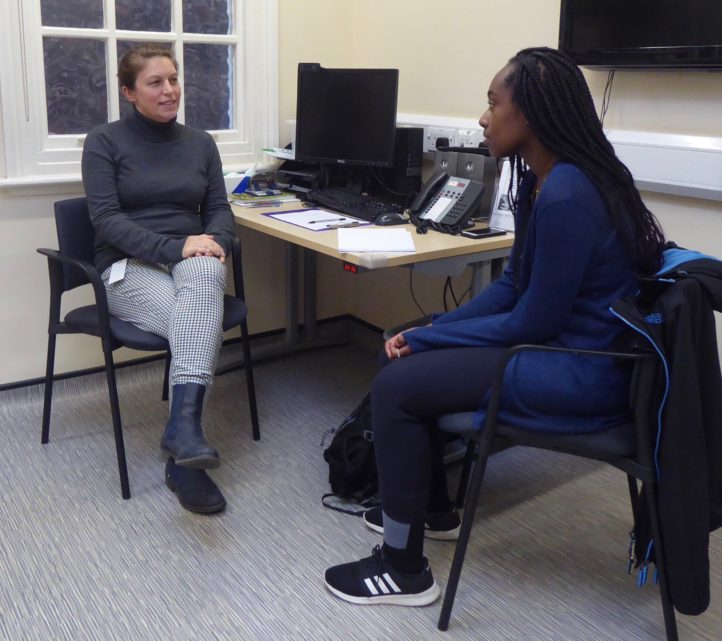
What is stammering?
In this section we talk about what stammering can be like on the inside for people (thoughts and feelings and how people cope with it) as well as what it looks or sounds like . Stammering is different for everybody but you may find something that you relate to. Getting to know your stammer can be the first step in becoming more desensitised to stammering and getting on with living your life the way that you want to. Therapy can help you take the next steps.
Stammering means that your words get stuck. You know what you want to say but you can’t say it.
Stammering or stuttering?
Stammering and stuttering mean the same thing. We use stammering at the MPC.
The stammering iceberg
Stammering is often likened to an iceberg because some of stammering is on the outside (like the part of the iceberg that is above the water) and some is hidden so that maybe only you know about it (the part of the iceberg that is below the water). We call these the overt and covert aspects of stammering.
- I repeat whole words, e.g. “and-and-and then I left”
- I repeat bits of words (sounds or syllables) e.g. “wh-wh-when are we going?”
- I prolong or stretch sounds, e.g. “I like mmmmusic”
- I block – my tongue and lips are in position to say a word but the air stops flowing and my tongue, lips and jaw stop moving. I feel stuck
- I tense up or push with my face or body to try to get the word out
- I do something with my body to try and get the word out (e.g. stamp my feet, shift position, move my head, blink my eyes, or tap my fingers)
- I do something with my body to try to hide my stammer (e.g. putting a hand over my mouth, turning away)
Thoughts
- I worry about what people might think (i.e. that they will think I am weird or stupid, or that there is something wrong with me)I
- I worry about how people will react (i.e. that they people won’t listen to me, that they’ll walk away, that they will laugh at me or talk about me behind my back)
- I have a negative belief about myself because of my stammer (i.e. I think that I’m not good at talking because I have a stammer, that I can’t do things because I stammer, or won’t be able to do things in the future because I stammer
- I go over and over things in my mind (i remember all the things that I wasn’t pleased bout and I give myself a hard time)
Feelings
- I feel anxious, nervous or embarrassed, ashamed, frustrated, sad, guilty, angry or helpless
Things I do to hide my stammer
- I sometimes decide to stay quiet (i.e. choose to not put my hand up even though I know the answer, not join in group discussions, not speak as much as I would like to when I’m with my friends)
- I sometimes change words so I can use a word that feels safer, even though it isn’t what I really wanted to say
- I sometimes say “it doesn’t matter” or say as little as possible
- I find ways to get out of doing presentations in class or try to go last to put it off
- I’ve chosen subjects, or am thinking of choosing subjects that don’t involve as much talking
- I sometimes say no to invitations to go out
- I don’t use the telephone unless I have to
- I ask someone to speak for me, like asking a friend to order food for me.
These are all things that many people who stammer do to cope. Probably not all the time, but in some situations.
What can I do?

Everyone is different. Some people want help and some people don’t particularly. Both are fine
If you want help talk to your local speech therapist, to a parent, or to your GP about getting referred to the MPC. If you are 16 or over you can refer yourself.
Find out about our assessment clinic for 2-18s here.
Get referred or refer yourself if you are 16+ here:
Did you know?
Stammering starts around 2 and a half – 3 years of age
The same number of boys and girls start to stammer but girls are more likely to stop stammering over time so there are usually more teenage or adult men who stammer than women
Stammering has got nothing to do with intellectual ability
It tends to be variable – it can change from day-to-day and from one situation to another
Other people may not know that much about stammering and society as a whole has traditionally viewed it as a “problem” that needs to be “fixed.” No wonder many young people who stammer often feel embarrassed about it.
Lots of famous people stammer so it doesn’t have to stop you doing what you want to do.
Gradually society is becoming better educated about stammering.

Sometimes you just need someone to talk to


Sometimes you just need someone to talk to
Our Helpline, 020 3316 8100, is open during office hours (9am-5pm) and voicemail messages can be left when the office is closed.
“It really helped me to understand what my daughter is thinking and feeling and how I can support her.”
